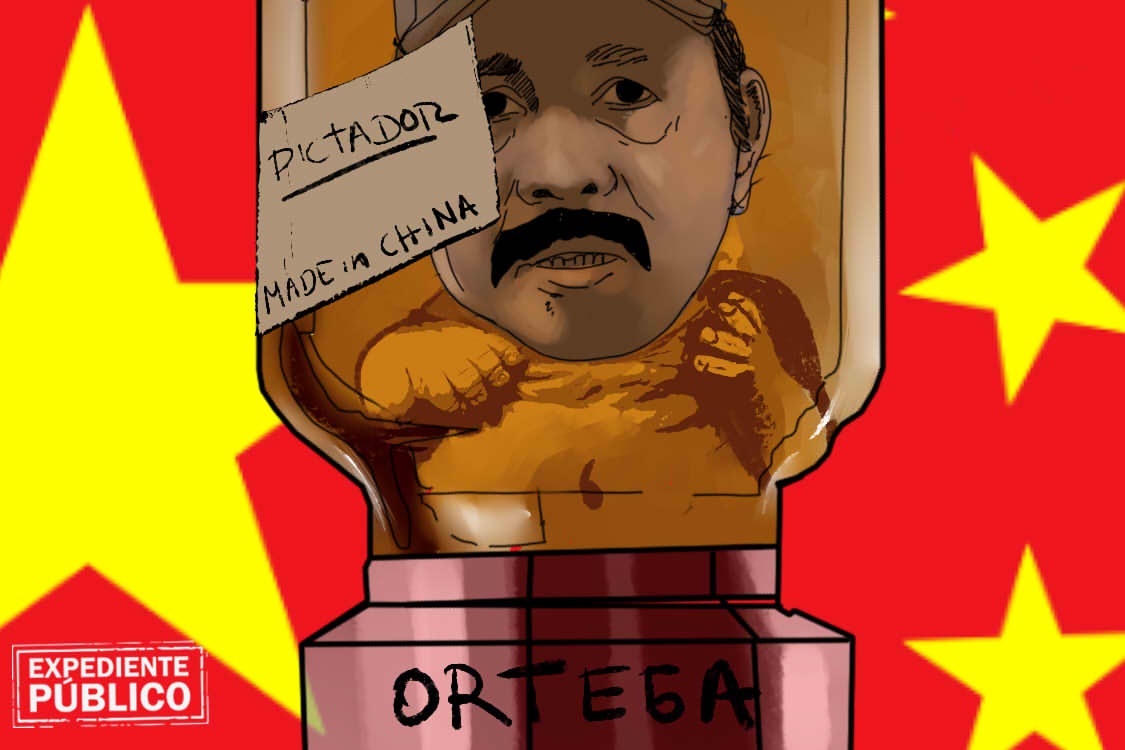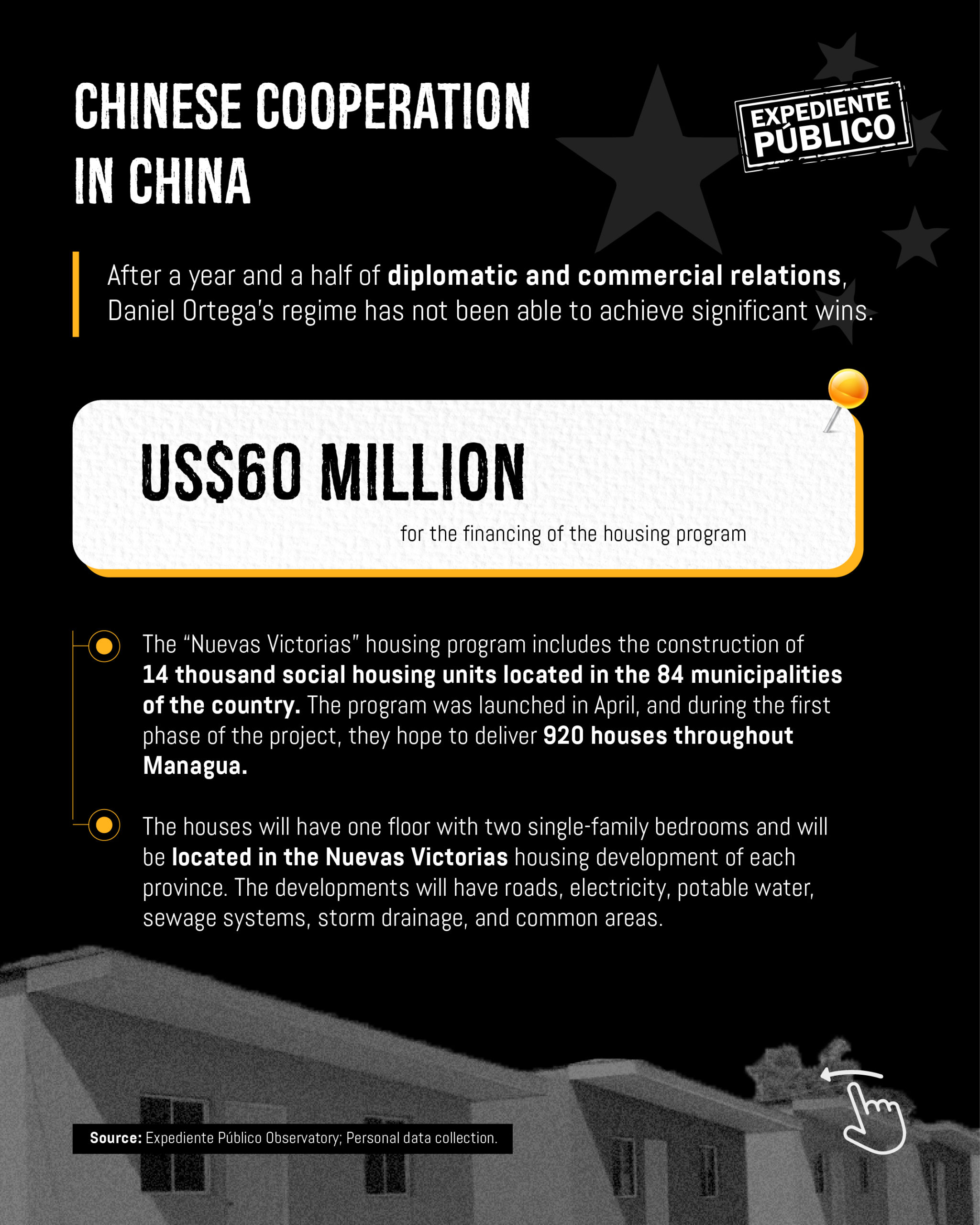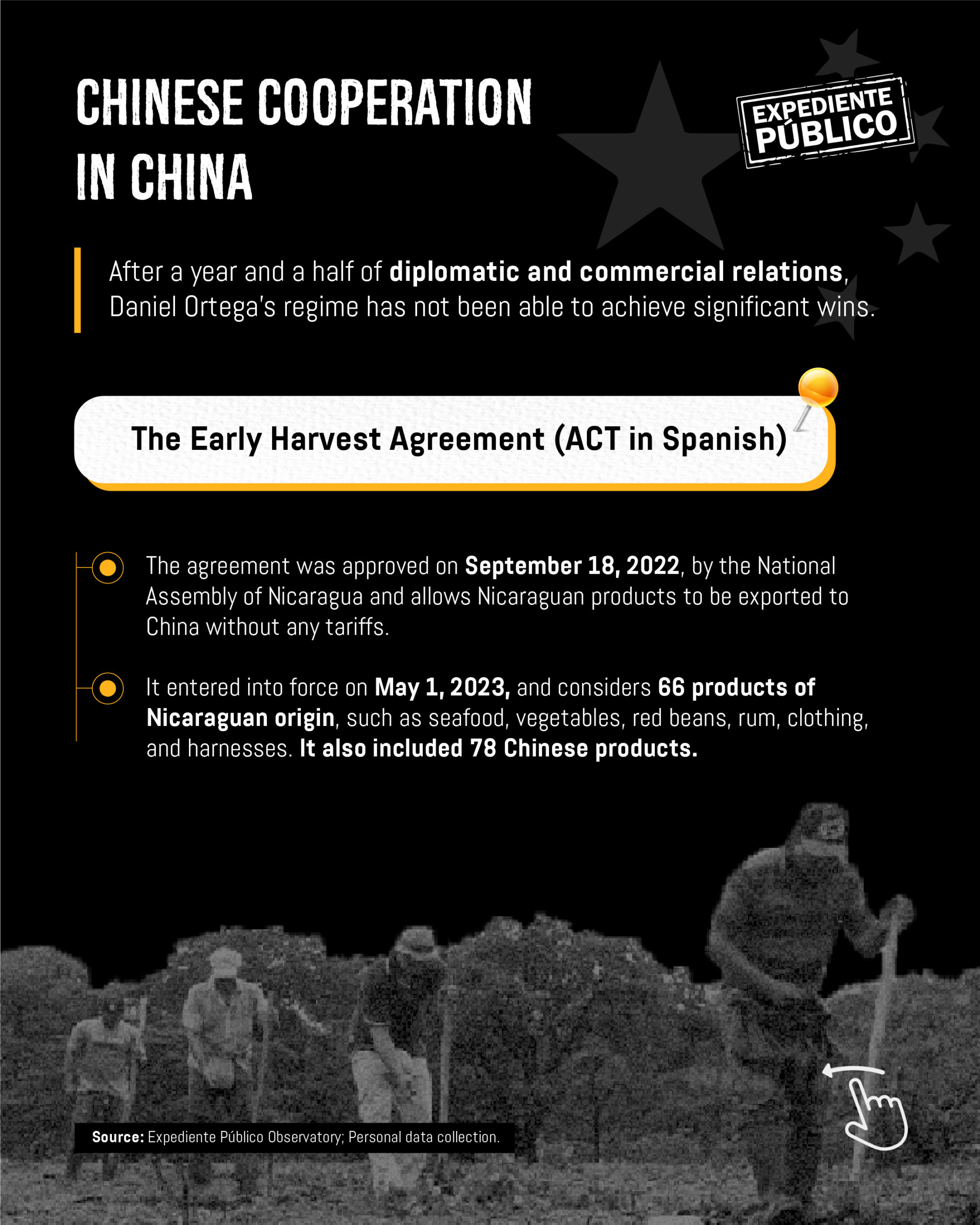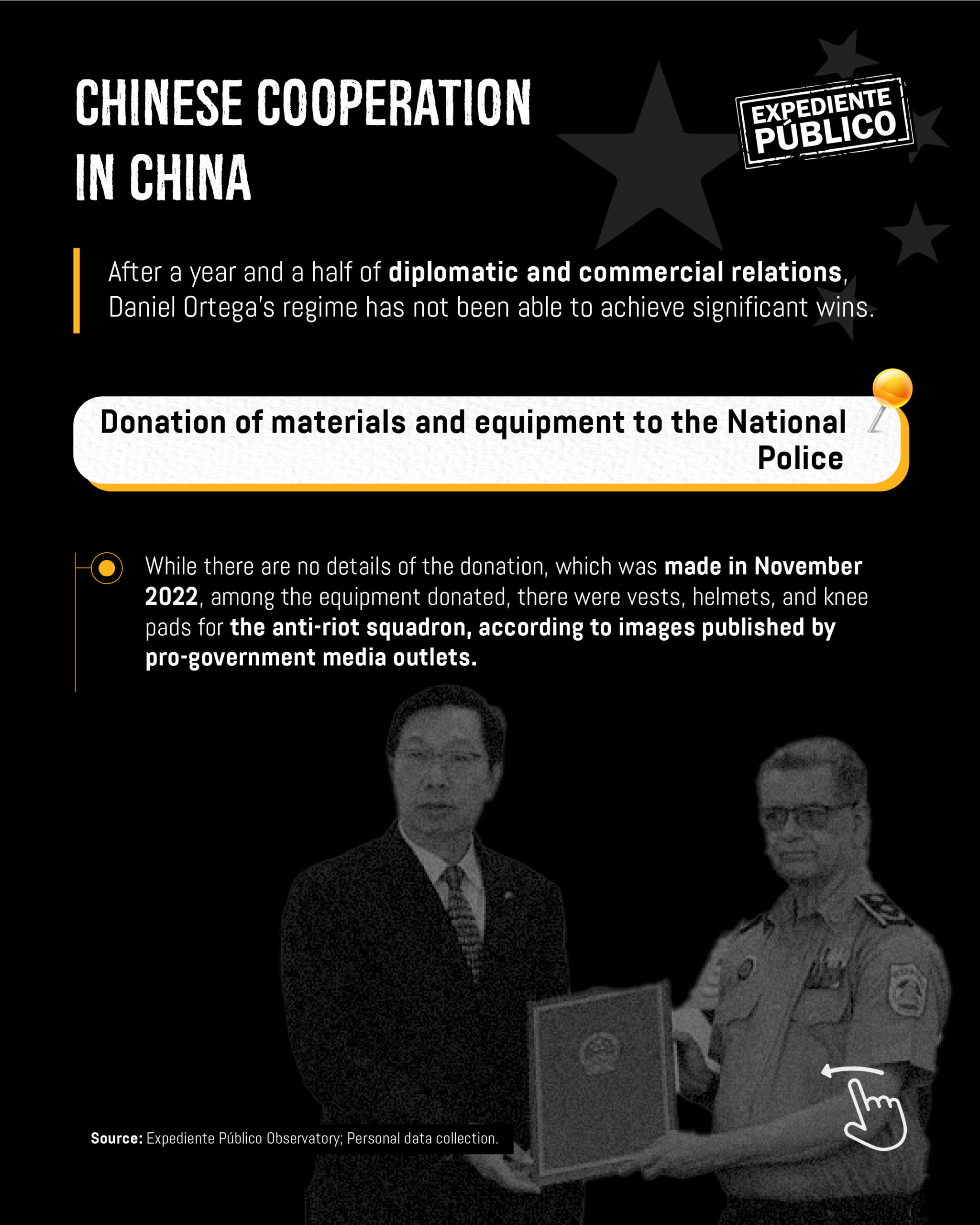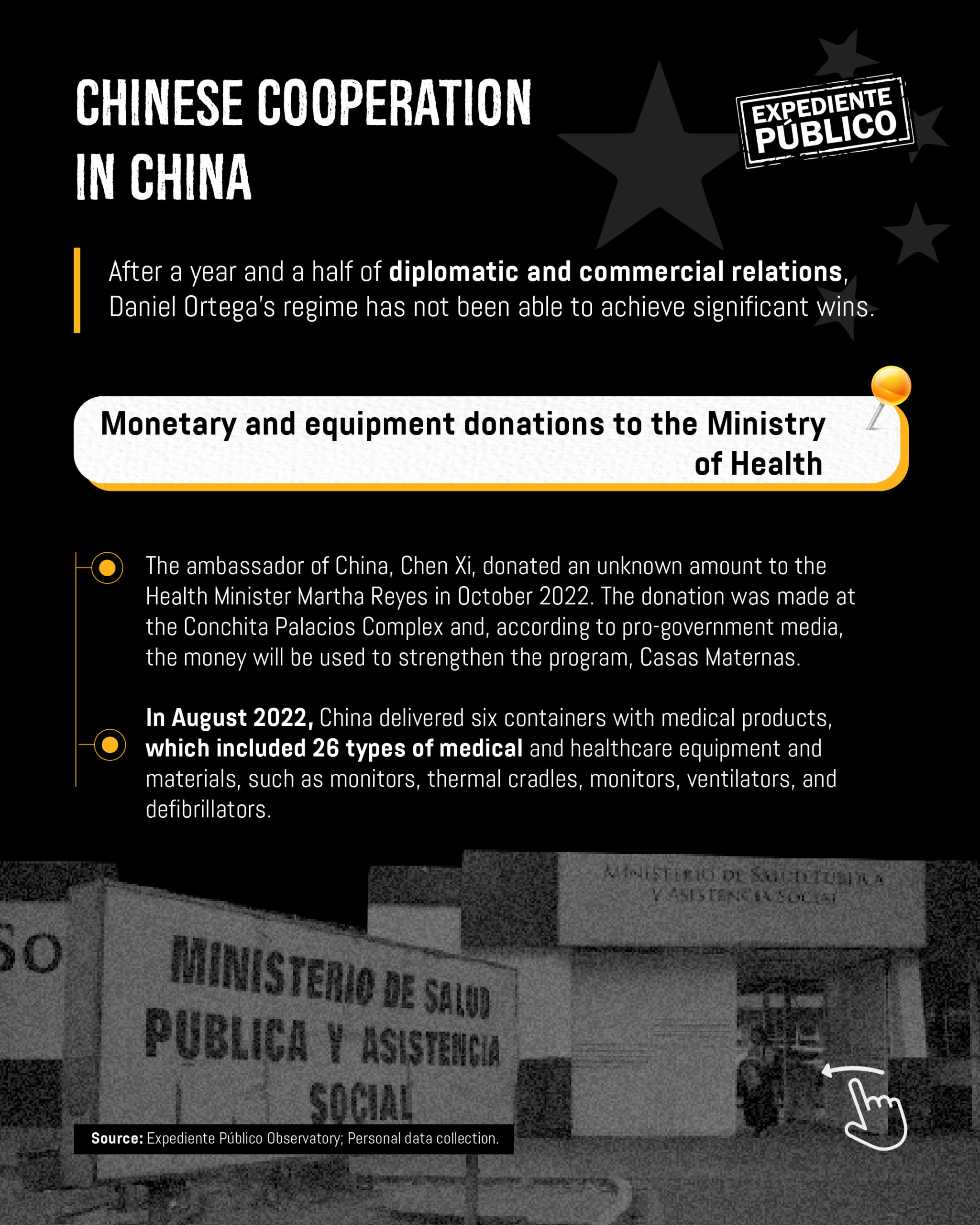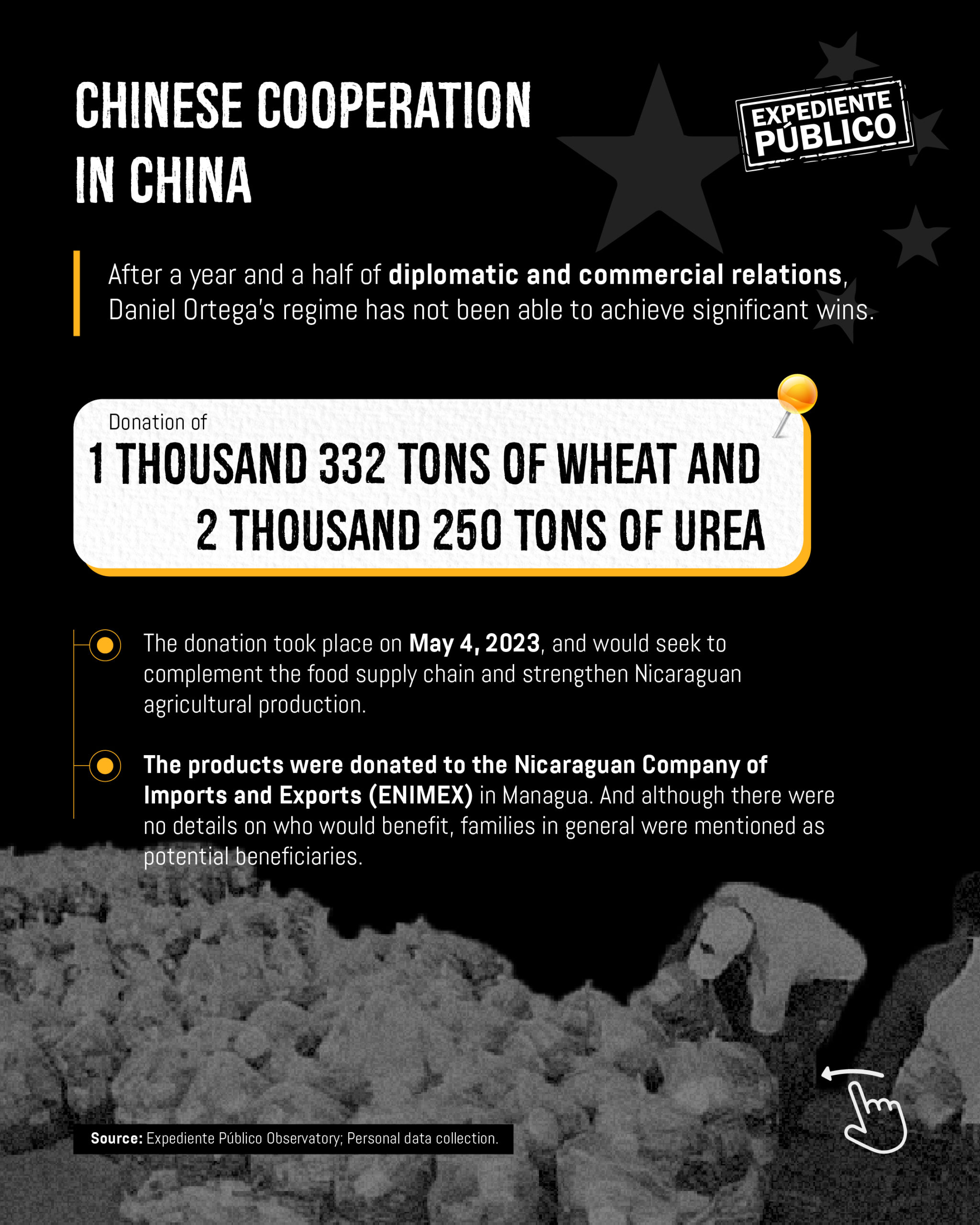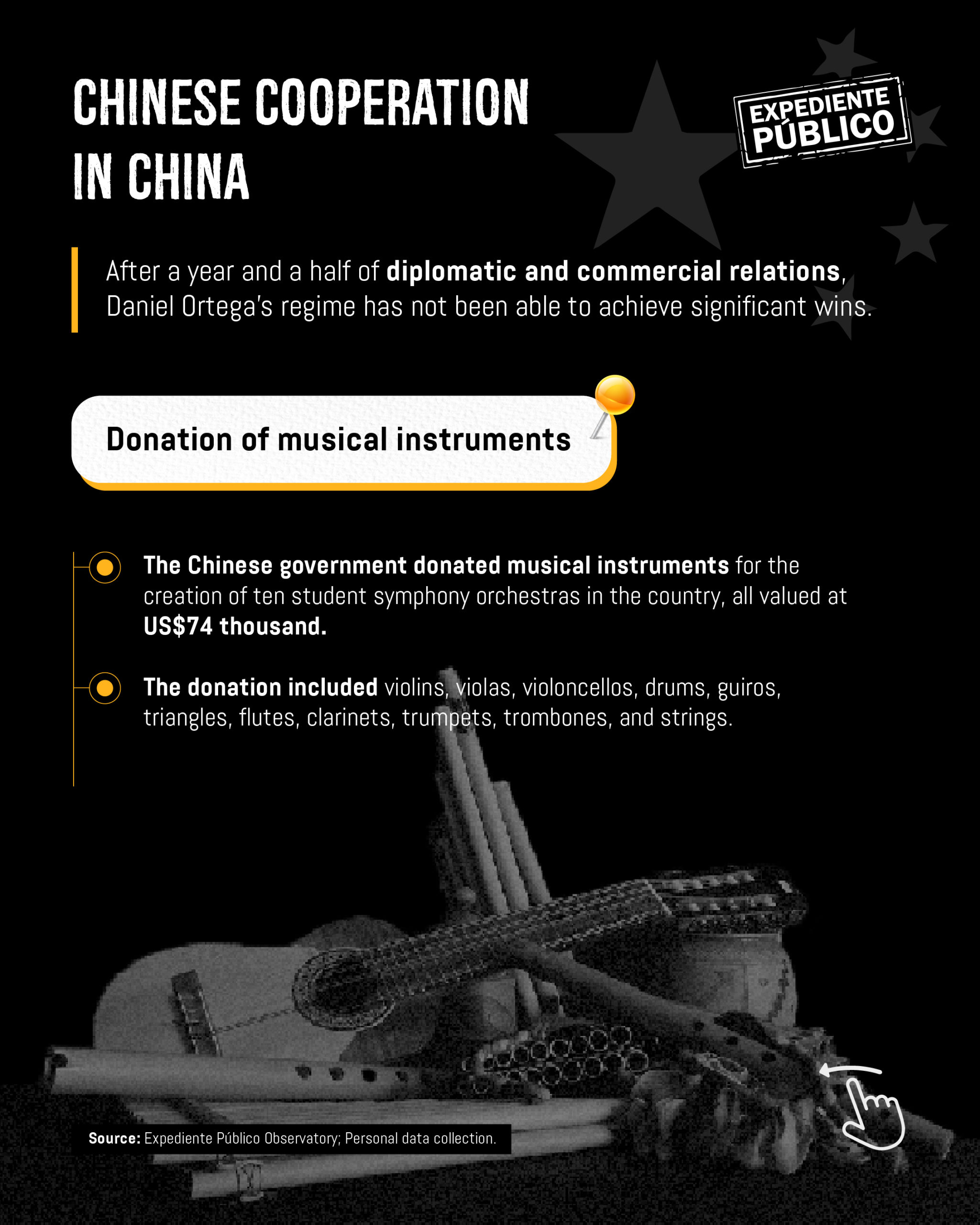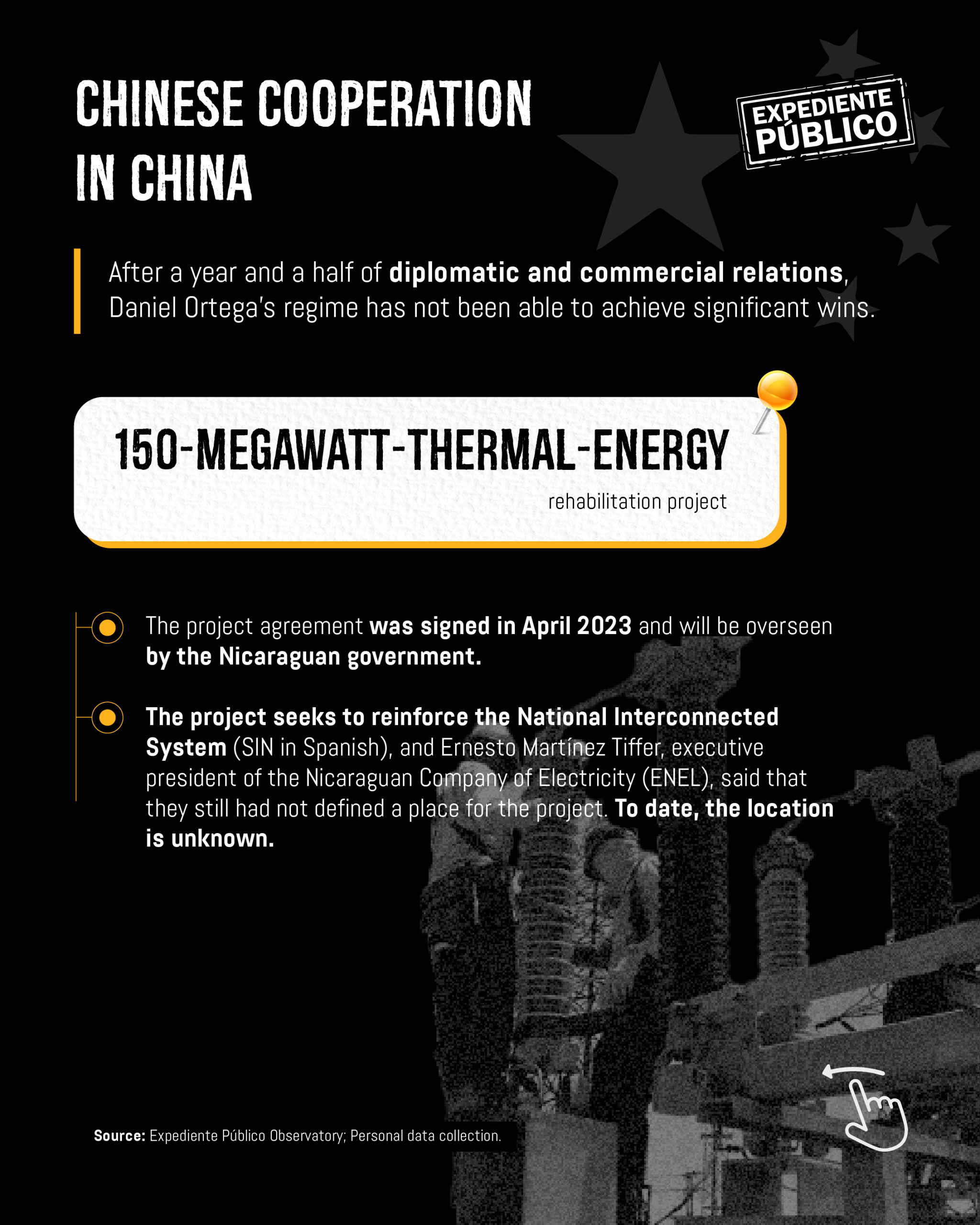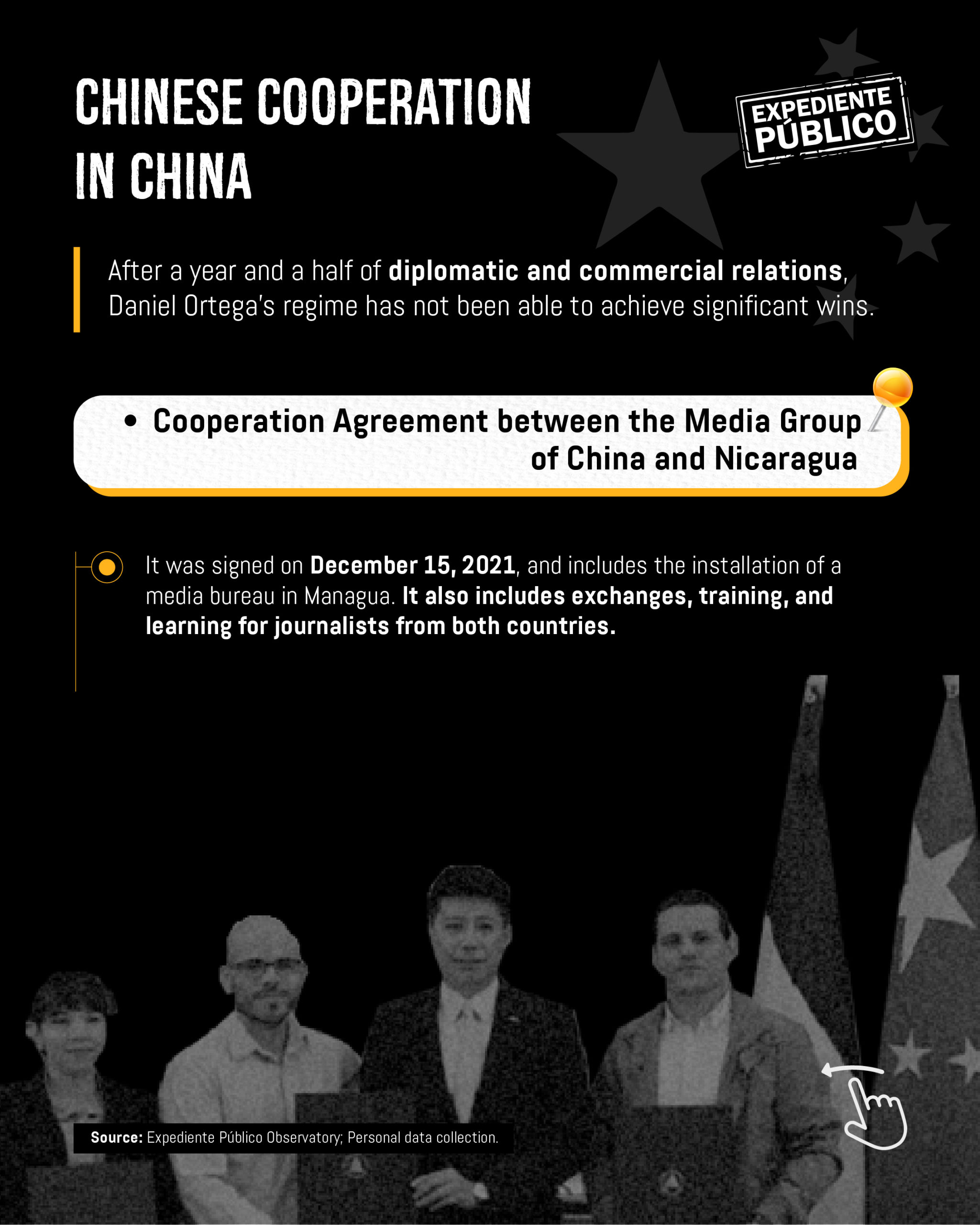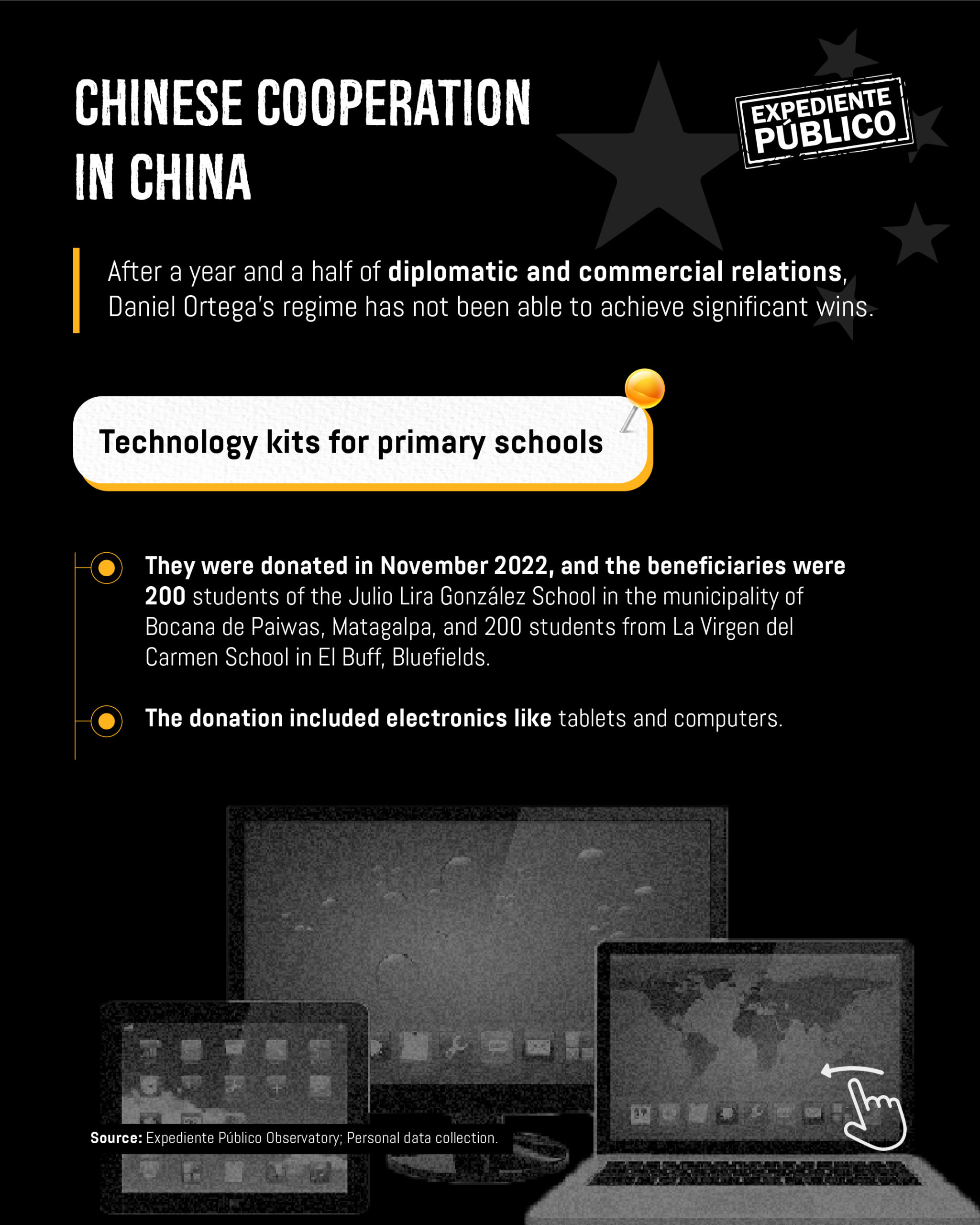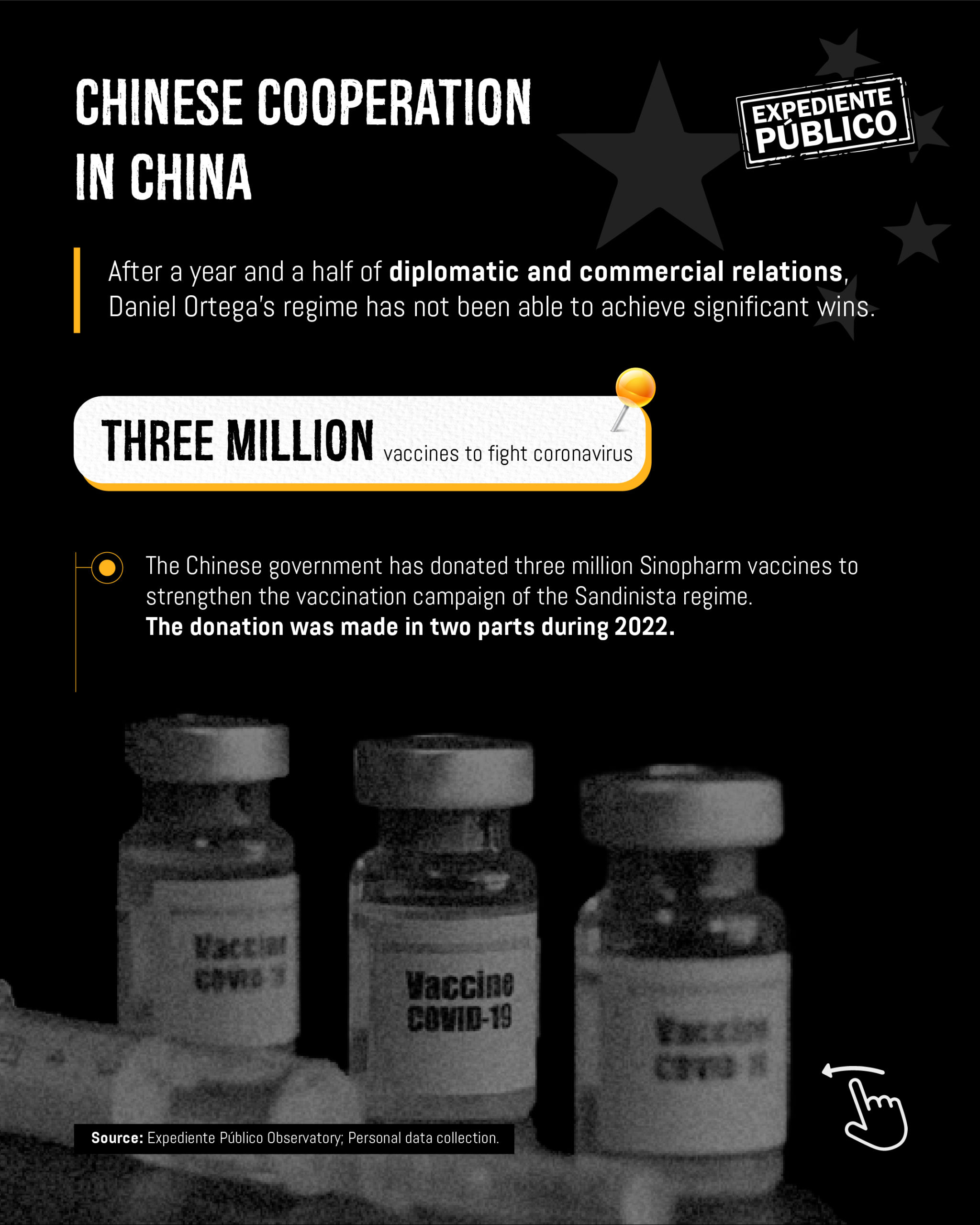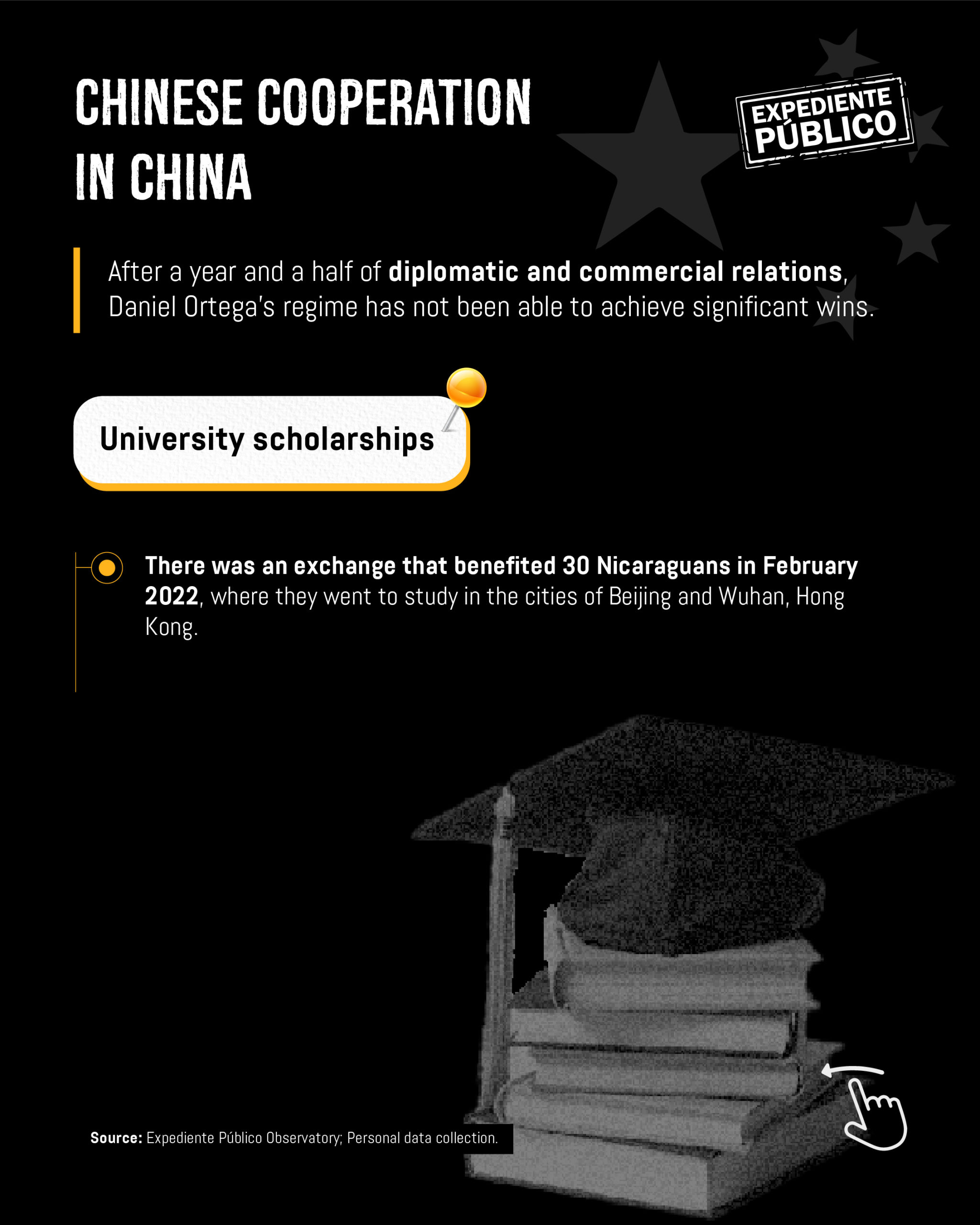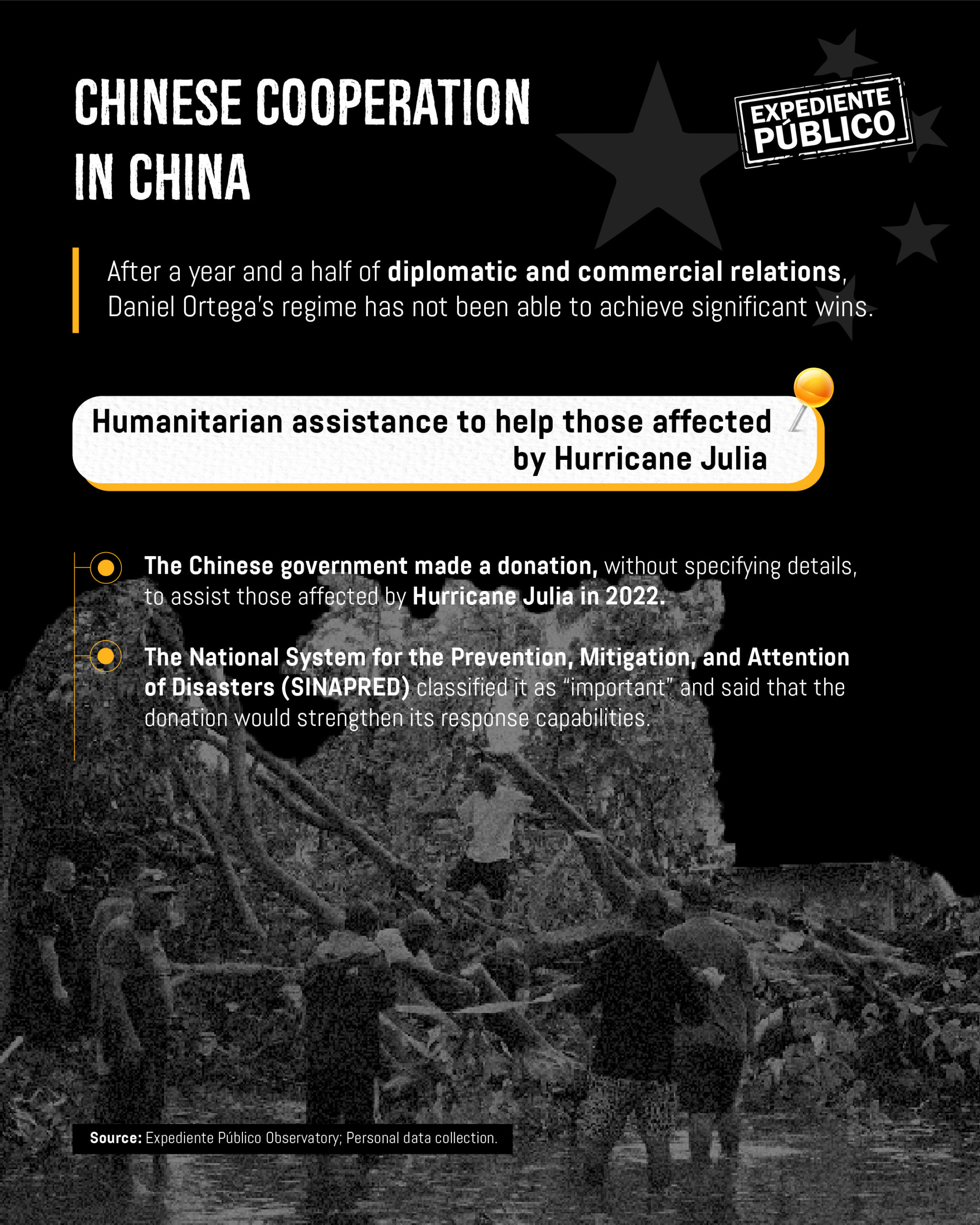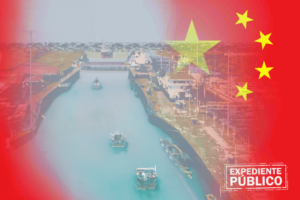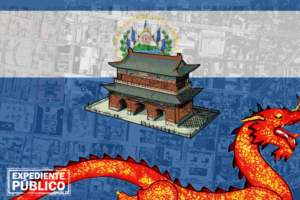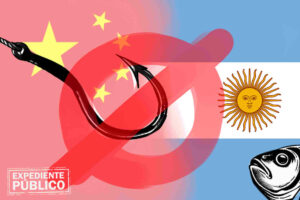*Diplomatic and commercial relations between both countries have not had significant reaches but rather, have been symbolic and limited.
**North American academic, Evan Ellis, tells Expediente Público that China does not need help from Nicaragua.
***The partnership between Ortega and the Chinese sought to keep the Sandinista regime in power and benefit its officials, according to experts.
Expediente Público
The diplomatic partnership that Daniel Ortega’s regime established in Nicaragua with the People’s Republic of China has not shown to be significantly beneficial in matters of cooperation and investment if compared with the relationships that it has with other countries in Latin America.
The Chinese have won over the Sandinista National Liberation Front (FSLN in Spanish) with little projects and programs, along with donations, which do not really translate into significant development for the Central American nation. Even still, it is the discourse that the pro-government media outlets and party fanatics exalt as huge achievements.
Nicaragua and China established diplomatic relations on December 9, 2021 after the Sandinista regime announced the end of diplomatic relations with the Republic of Taiwan, which consolidated in recent years as a primary ally to Daniel Ortega and Rosario Murillo’s regime.
The international analyst at the School of International Relations at the National University of Costa Rica (UNA in Spanish), Carlos Cascante Segura, told Expediente Público that, in the case of Nicaragua, citizens hoped that the reestablishment of diplomatic relations would translate into better investment. He also planted three hypotheses to explain why this has not occurred.
Read: Nicaragua e Irán se acercan para tratar de evadir sanciones por violaciones de derechos humanos
The first, he says, is that China could doubt the stability of the Sandinista regime and long-term investments because of the “complex” situation that Ortega and Rosario face in Nicaragua, where the majority of the population demands his exit from power and a trial for the crimes of humanity that he committed against civilians.
The second could be that the Asian country is acting prudently, which would mean trying to avoid upsetting the United States with its relationship with Nicaragua and the rest of Central America, countries that have been very close to and dependent on the North American government.
Lastly, according to the expert, it is the ambivalence and errotic behavior of the Sandinista regime “that have determined that [Nicaragua] is not a consistent actor with which to work,” discouraging the government and companies that have wanted to invest more in the short time that the two countries have had a diplomatic relationship.
China does not need Nicaragua
Evan Ellis, North American academic and research professor in Latin American Studies at the Strategic Studies Institute of the US Army War College, agrees that there are different reasons why the Ortega-Murillo family have received limited benefits from China. Among them is the fact that the Chinese government waited a long time for relations to be reestablished with Nicaragua, which first took place in 1979.
Moreover, the Sandinista regime considered China to be its last option, as it made the most of its relationship with the Taiwanese and other partners, in addition to using the Chinese to avoid isolation from the international community and take a break from economic sanctions from the United States and Europe.
“The People’s Republic of China is not in a hurry to help the Ortega family, but I also think that it understands that Nicaragua needs the help more than it does at the moment,” said the academic, who believes that China will not benefit much from helping in a big way.
After a year and a half of this bilateral partnership, the more emblematic reach that Nicaragua has had through its cooperation with China is financing the New Lives Housing Program, which aims to construct 14 thousand houses in different provinces of Nicaragua. The project symbolizes the only direct investment from China to date, where the Asian giant gave the country US$60 million.
Read: América Latina: China y sus métodos para infiltrarse en las sociedades
There is also the Early Harvest Agreement (ACT in Spanish), which came into force May 5, 2023, was signed by both countries, and allows imports and exports at zero tariffs. According to the discourse of the Sandinista regime, this agreement represents a prelude to a free trade agreement (TLC in Spanish) that it hopes to establish with the Asian country.
The pact between the two countries is also reflected in the donation of materials and equipment for the Ministry of Health (Minsa) and the National Police (PN), targeted by the Nicaraguan opposition and the international community for being the repressive arm of the Sandinista regime.
Francisco Díaz, son-in-law of Daniel Ortega and Rosario Murillo, presides over the police force. Under his leadership in July 2018, the institution was charged by the Department of the Treasury with “having committed human rights violations against Nicaraguan civilians.”
With the reestablishment of diplomatic relations with China following the break with Taiwan, Nicaragua received 200,000 doses of the vaccine Sinopharm on December 10, 2021, to combat COVID-19, which was part of its policy to donate one million vaccines throughout the region during the pandemic.
Likewise, in the framework of encouraging close ties of cooperation, the Nicaraguan regime sent some 30 young people on scholarships to China.
There was also the donation of musical instruments to symphony orchestras throughout the country and alliances with pro-government media outlets. China has also invested in projects related to water and sanitation, energy, infrastructure, health, and education, in addition to economic development and culture.
Among the achievements celebrated by the Sandinistas in Nicaragua are the signing of the memorandum of understanding (MOU) to establish an agreement of mutual support and tools for political consultancy, cooperation on trade, and the waiving of visa requirements for holders of diplomatic passports from both countries.
“As friend and brother of Nicaragua, we are willing to make our contributions to the social and economic development of Nicaragua,” said Cai Wei, director for Latin America and the Caribbean at the Ministry of Foreign Relations of the People’s Republic of China during a visit to Nicaragua in April of this year.
Also read: Puma Shen, director de índice de China: «Pekín aprovecha corrupción política en América Latina»
Symbolic benefits
For Ellis, China’s offers to Nicaragua have been symbolic and do not make up for the exports that the country achieved with the Republic of Taiwan. They also fail to measure up to the benefits that other countries in the region have received from China.
In the first four months of 2023, exports from Nicaragua reached US$1.49 billion and spanned 100 products, according to Nicaragua’s Export Processing Center (Cetrex).
Regarding the trading relationship with China, Nicaraguan exports were US$5.58 million dollars, made up of oil and fat products. This, according to Cetrex, represented the drop in US$157.7 thousand, compared to the same period in 2022.
Bilateral cooperation is not sustainable, and the balance will always be negative for Nicaragua, explained Ricardo Ferrer Picado, strategic analyst, to Expediente Público. Moreover, he points out that the energy distribution services and infrastructure connectivity that China can provide will be paid for in exchange for sovereignty and national resources.
“It is a revival of colonialism but with Nicaragua as a secondary actor in the confrontation between China and the United States and the war between the yuan and the dollar,” Ferrer says. The situation does not benefit Nicaragua and has made it so that “the objectives of Ortega’s dictatorship have not been met and will not be met in the future.” It also complicates logistics, adds the expert, who explains that it makes freight more expensive and harder to get due to the countries’ geographic positions and because Nicaraguan prices are not competitive.
Read: China y sus tres niveles de penetración en tres países de Centroamérica
The analyst predicts that Nicaragua, instead of producing more, will have to export primary products without any added value and that it will do this through ships that arrive with products from China. With that, the Central American country will replicate a colonial scheme of yesteryear and will have new mechanisms of commercial dependence, without the ability to negotiate and accepting “its new role as a satellite country that is dependent on the People’s Republic of China.”
Premature results
In the opinion of expert Carlos Cascante and Tiziano Breda, who is an analyst on Central America for the International Crisis Group, the period of time that has passed since establishing diplomatic relations is very short, which could mean that they are subject to changes or projects in the near future.
Breda tells Expediente Público that most countries that establish relationships with China do not obtain immediate benefits.
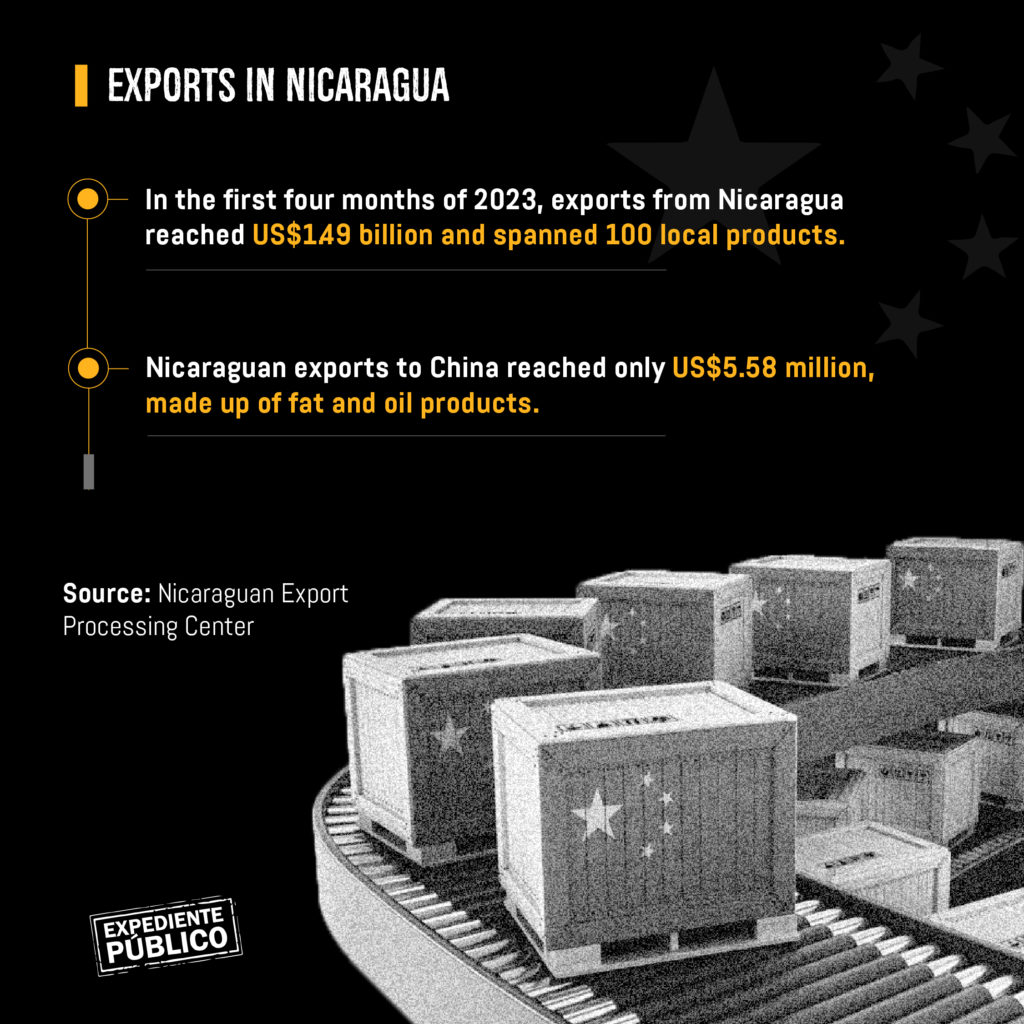
Moreover, he emphasizes the case of Central American countries and says that this period is even longer for them, given that they do not have raw materials to offer like Brazil or the Andean countries, which makes China not as interested in investing or expanding its trade relations with them.
The expert affirms that China is cautious to invest in Nicaragua, as the precedent is the failed project of the Interoceanic Canal, which was never executed but that was a considerable investment by the Chinese. “The Chinese seem to not want to speed up the injection of resources [into the Nicaraguan economy],” he adds.
Who benefits more?
Regarding which of the two countries has more of an advantage in maintaining this partnership, Breda points out that in political issues, such as the policy on Taiwan, both countries benefit.
“China clearly has an advantage over Taiwan politically as it has been able to take another partner country from them, which means that there is one less country that continues to recognize Taiwan as an independent country and not part of mainland China. Ortega, on the other hand, gains minimal influence from the relationship due to the very reason that the Chinese government is trying to take advantage of Nicaragua, especially at the economic level,” he says.
The expert adds that, over time, an exponential increase in trade between the two countries will occur. “China often uses these trade agreements, primarily, to expand its exports to the countries with which it establishes trade agreements,” he explains.
He also predicts that the trade balance could favor China in the first period of diplomatic relations.
Ferrer, the analyst, says that the dictatorship in Nicaragua will benefit from Chinese protection and “the double standards of the countries in the world that have different economic dependencies on China to avoid condemnation from other countries on human rights in view of its systematic violations and trade sanctions.”
Read: Las migajas que China entrega a Nicaragua
He says that the Chinese regime will become a legitimizing “factotum” in the succession of the Ortega-Murillo regime.
He adds that China will achieve a strategic military position in Central America and have more efficient narratives regarding Nicaraguan migration. “At the end of the day, China’s work will be strategic and slow but sustained over time, even after the death of the couple in charge of the dictatorship, because it will be one of the primary legitimizing factors for the regime’s successor(s),” he concludes.
You have to consider that Nicaragua offers the possibility to create a “hub for logistics and future canal,” which could bother the United States, something that China could take advantage of.
The expert predicts that Nicaragua will receive a large quantity of Chinese products, along with infrastructure projects, in exchange for military dominance and sovereignty in the case of China.
Power and special interests
The diplomatic relations that Ortega seeks to establish are focused on the survival of his regime and maintaining his power as ruler and that of his group of supporters who work for him, says expert Carlos Cascante.
“On the one hand, China offers certain investments in Nicaragua, which, without a doubt, will favor the coffers of many members of the regime; I believe that fact in particular is undeniable. But, at the same time, China will allow Ortega to become a more legitimate leader and say, ‘Well, we are not dependent on the United States; we have China,’” he explains.
Moreover, he says that these relations are centered around how the Ortega-Murillo family, whom he describes as greedy in economic terms, wants to expand their economic interests, both inside and outside of Nicaragua, despite internal pressures, such as poverty, which has forced millions of people to migrate to countries like the United States, Spain, and Costa Rica.
Meanwhile, Breda does not doubt there is some sort of interest in particular, “but I also do not have evidence of this. That said, I would not go so far as to say that there are special interests at stake, whether regarding family or allies.”
Read: Laureano Ortega, «el canciller de facto» en las negociaciones con China
Despite being rejected by the majority of Nicaraguans because of the way in which Daniel Ortega has governed Nicaragua, the dictator looks to hold on to power by way of repression, encarceration, death, or exile for those who express their discontent and opposition to his policies.
What are the consequences?
These relations also imply, for the Sandinista regime, the support from a country like China, which takes on the role of a world power, according to Breda, who explains that Ortega and Murillo aim to reduce the international isolation that they have faced in recent years due to human rights violations and the crimes that they have committed against Nicaraguans.
Regarding whether this partnership will mean consequences for the sovereignty of the country in the long term, Breda says that much will depend on the size of the political and economic investment that China decides to make in Nicaragua.
“As long as the relationship remains limited to minor investments and small-scale exchanges, there will not be any particularly substantial consequences. The more China invests in debt or things of this sort, the more dependent Nicaragua will become on China. However, we do not yet have the details to know what the consequences will be in the long term,” he warns.
In the opinion of analyst Carlos Cascante, it will be necessary to establish China’s interests and how far the country wants to take its relationship with Nicaragua. He adds that China “does not have the least bit of interest in getting involved in the internal affairs of Nicaragua,” as its primary objective is to conduct business in Latin America.
For the expert, people should be asking how or how much China’s close relationships with Central American countries affect the United States and its sense of security. “We are facing a confrontation not in the short term but in the long term. And these types of relationships are going to become normal in Central American life in the coming years,” he concludes.

